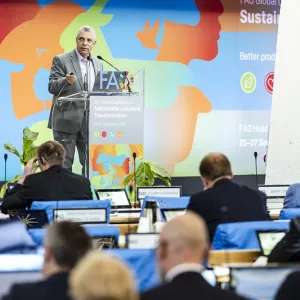‘It's not the cow it’s the how’ - First ever FAO Global Conference on Sustainable Livestock Transformation focuses on better production, better nutrition, better environment and better lives
Engaging in dialogues on innovations and pathways to efficiently produce more nutritious, safe and accessible animal sourced foods with a reduced environmental footprint was the central theme of the first-ever Global Conference on Sustainable Livestock Transformation organized by the FAO. The three-day event brought together a diverse range of stakeholders, including representatives from member nations, producer organizations, research institutions, development

‘It's not the cow it’s the how’ - First ever FAO Global Conference on Sustainable Livestock Transformation focuses on better production, better nutrition, better environment and better lives
Engaging in dialogues on innovations and pathways to efficiently produce more nutritious, safe and accessible animal sourced foods with a reduced environmental footprint was the central theme of the first-ever Global Conference on Sustainable Livestock Transformation organized by the FAO. The three-day event brought together a diverse range of stakeholders, including representatives from member nations, producer organizations, research institutions, development agencies, civil society, and the private sector. Mounir Louhaichi, an ICARDA Team Leader specializing in Rangeland Ecology and Forages, attended the forum to present on the importance of livestock management for healthy rangeland systems, showcasing that it is ‘not the cow but the how’.
During the conference’s ‘Better Environment’ session, Louhaichi delivered a concise yet impactful presentation, stressing the significance of the ‘how’ in livestock production. His central message underscored the role of livestock as a tool to enhance rangeland conditions and highlighted how the management of resources profoundly influences the environmental footprint of livestock.
Supporting his message with facts, Louhaichi pointed out that one million people rely on livestock for their livelihoods and nutrition. Rangelands cover 54% of the global terrestrial surface, and 33% of arable land is allocated to animal feed production. He emphasized the multifaceted role of livestock, converting inedible vegetation into nutrition-rich products for humans while contributing to healthy ecosystems. He then explained the intricate relationship between global drivers, unsustainable land use, and its impact on ecosystems. Addressing both indirect factors like climate change, population growth, and evolving consumption patterns, and direct drivers such as intensive agricultural practices, unbalanced grazing, and poor governance, he emphasized the importance of restoration to mitigate these impacts.
Louhaichi’s presentation outlined key areas for sustainable livestock management, including animal feeding practices, improved manure management, proper grazing management through rotational grazing and seasonal mobility, and the essential role of technology, including Geographic Information Systems (GIS).
‘Climate is a threat multiplier, exacerbating existing risks and insecurities that may lead to further tensions and conflicts. This holds particular significance for livestock agrifood systems, where conflicts on natural resources access, use and management (land, pasture and water) are a widespread concern. The Livestock and Climate initiative is one step in the right direction. The initiative serves as a catalyst, but securing additional funding is crucial to achieving a genuinely transformative influence on the complex interplay among livestock, climate, and environmental dynamics,’ says Louhaichi.

Additionally, Louhaichi contributed to the FAO’s ‘Twelve Success Stories’ exhibition, showcasing his research on the restoration of the Sbaihia site in Tunisia. Collaborating with organizations like ICARDA, FAO, and the Direction Generale des Forets de Tunisie, Louhaichi played a key role in implementing agrosilvopastoral practices, resulting in remarkable improvements such as a tenfold increase in biomass at the restored site compared to the control site and a significant drop in in feeding costs.
Mounir’s contributions at the conference and in the field exemplify the commitment needed for sustainable livestock transformation. His nuanced perspective on livestock and overgrazing emphasizes that it’s not the cow determining environmental impacts but rather the management of livestock and systems.
Participation at the event was supported by the CGIAR Research Initiative on Livestock and Climate.
Header image: Mounir Louhaichi presents, ‘Balancing Livestock Production and Sustainability of Natural Resources’. Photo by M. Louhaichi/ICARDA.
Story by Madison Spinelli

